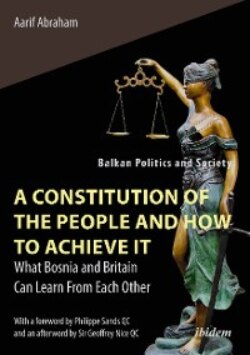Читать книгу A Constitution of the People and How to Achieve It - Aarif Abraham - Страница 5
ACKNOWLEDGMENTS
ОглавлениеThis book would not have been possible without the conversation, counsel and guidance of a great many friends and colleagues who have added immeasurably to my understanding of politics, law and international relations over the course of my academic and professional callings. Our interactions have made writing this book enjoyable and highly rewarding.
I am very grateful to Professor Philippe Sands QC, Sir Geoffrey Nice QC, Baroness Helena Kennedy QC, Hon. Dr Brett Mason, Dr Valery Perry, and Margaret Owen OBE for their contributions to this book, as well as their critical thoughts and reviews. A much better book is the result.
I am indebted, in particular, to my friends and mentors: Helena Kennedy, Geoffrey Nice, Valery Perry, Kyrie James and Salim Ibrahim. They have often given up their valuable time, without asking for anything in return, to help resolve dilemmas and difficulties. In this case, they have extended their kindness to tackle seemingly intractable ones in Bosnia and Britain.
I would like to give thanks to a number of colleagues who contributed directly to the preparation of this book. Valery Perry is a leading scholar on Bosnian constitutional reform. Without her constructive, challenging and critical comments whatever nuance and distinction there is in this book would have been lost.
I was very privileged to have been taught, and encouraged in my thinking about Bosnian constitutional reform, by the late Zdravko Grebo. He never once suggested that conventional thinking might be the answer to elusive endeavours in pursuit of peace and justice. As one of the young leaders of the first mass protests in Yugoslavia, he inspired many a mind to stand upright, and without fear, in the face of powerful and insurmountable behemoths. I hope I am a worthy student.
I had insightful discussions about constitutions with Dr Kurt Bassuener, Professor Daniel Sewer, and Ewelina Ochab. Kurt Bassuener provided much food for thought drawing upon his many decades of experience and scholarship on the Bosnian constitution.
Dr Rachel Kurian and Alina Trkulja provided useful comments and direction as to the structure of my original thesis and Dr Mansoob Murshed, a specialist in game theory, helped develop the models adopted in this book through his feedback.
I received very helpful critical suggestions on either the proposal or parts of the draft manuscript from: Dr Miles Jackson, Mark George QC, Andrew MacDowall, Dalila Sadinlija, Kate Young, George Mitchell, Kerim Suruliz, and Natasha Jackson. This book, in style and substance, is much improved as a result. Among the kind readers of the manuscript was Patrick Page. As a master of the written word, he led me on a testing, but extremely rewarding, journey in questioning all my defaults as to style. I am grateful to him.
Lily Lewis, through a fortuitous turn of events, assisted me with some further research on political culture in Bosnia and Britain and contributed to those chapters. I had remarked to Lily, knowing she had no prior connection with Bosnia, that it was no coincidence that the Golden Lily happened to be the symbol of Bosnia. I hope this book, and Lily’s contribution, will help add to the corpus of knowledge on good political culture and its cultivation, growth and bloom in both Bosnia and Britain.
Last but not least, I would like to thank my colleagues at Ibidem Press who have been unfailingly kind, supportive and helpful from proposal to publication: Jakob Horstmann, Valerie Lange, Dr Soeren Keil, and Dr Jelena Džankić.
Although the suggestions and comments of these readers greatly improved the final manuscript, I alone am responsible for the interpretations appearing in this book and for any flaws, errors or omissions that remain.
Aarif Abraham
Garden Court North Chambers
Manchester, February 2021
